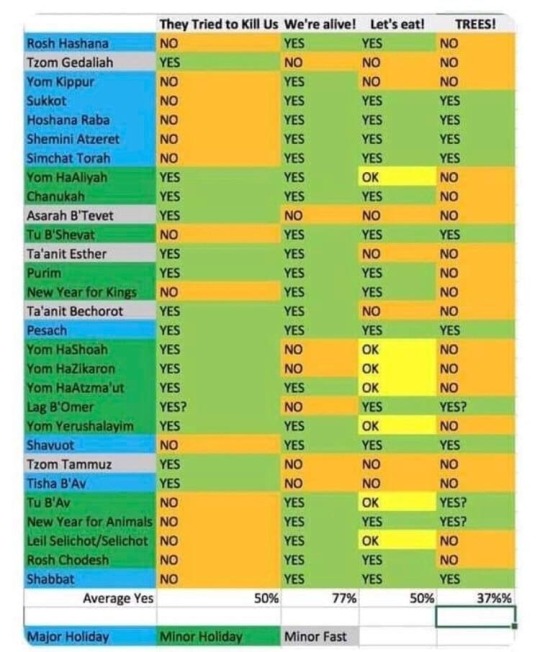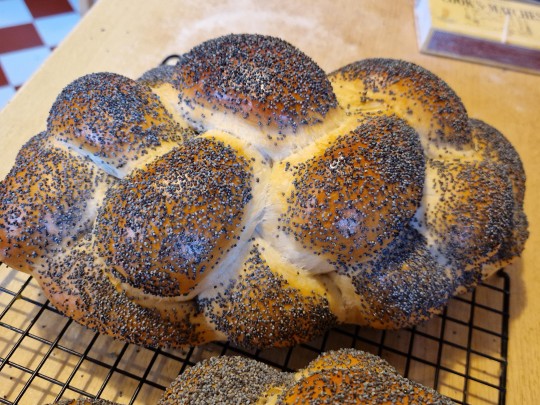#shabbat
Text
259 notes
·
View notes
Text

שבת שלום!
May you have a peaceful and blessed Shabbat!
Please Pray for peace and safety across Israel.
Pesach starts Monday Evening!
81 notes
·
View notes
Note
I'm reconnecting with my Judaism and I'm lighting shabbat candles for the first time in my adult life this week! Wish me luck!
P.S.: thank you thank you thank you for this blog, we really do need joy right now. Shalom!
Good luck! I'm so proud of you. Don't forget to take a few seconds to admire the light and the warmth of the candles. I always find it a beautiful moment
PS. I'm happy to be able to help the community in any way I can. If it makes even one person's day brighter, it's already a success
24 notes
·
View notes
Text
SHABBAT ✡️✡️ SAFETY INSTRUCTIONS ✡️✡️ for those in ISRAEL
via ISRAEL REALTIME - Connecting the World to Israel in Realtime
(( Note Israel Realtime does not post updates on Shabbat (Israel time) UNLESS life threatening / saving. ))
Chief Rabbinute instructions with Risk Adjustments
📖Erev Shabbat - Shabbat HAGADOL - Parshat Metzora: Leviticus 14:2, discussing the laws of ritual purity.
🍞SELL your Chametz, Passover is almost here! -> https://www.chabad.org/holidays/passover/sell_chometz_cdo/sc/passover_home_button
🔅Shabbat Times here -> https://www.myzmanim.com/search.aspx
⚠️RISK - WHOLE COUNTRY - MEDIUM-HIGH due to possibility of retaliatory attacks by Iran or their proxies, and such attacks may be large if they occur. Precautions REQUIRED, know your shelter options at synagogue, school, work and home - and at the store or mall or what actions to take if out in the open, at the beach or park.
❗️Don’t panic, however some preparations would be wise. Home Front Command -> https://www.oref.org.il/12490-15903-en/pakar.aspx (link only works in Israel)
➡️ MAMAD LIGHTS ON… leave the lights on, on Shabbat, so if there is an alert you don’t have to turn them on.
➡️ TAKE A PHONE WITH YOU… when sheltering or leave one on in the shelter. If you must call for help, have a way to do so quickly.
➡️ LEAVE ON AN ALERT METHOD… Leave on silent channel or stream on computer or phone, or alert app.
❗️DUE TO GPS JAMMING, alert apps must be set to specific city instead of ‘current location’.
➡️ SAFE TO GO TO SYNAGOGUE? - Follow instructions of Homefront Command and your City!
— HIGH Risk - only go to a synagogue that has, or preferably is in, a shelter. Otherwise pray at home.
— MEDIUM Risk - best to only go to a synagogue that has or is near a shelter. Where is it? Have a ‘when there is a siren’ plan in mind.
— LOW Risk - there will possibly be sirens, what’s your plan? Have one or choose another synagogue.
➡️ PLAN YOUR SHELTER PATH TO/FROM SYNAGOGUE - If an alert goes off en route, where will you go to be protected if on the way?
➡️ IN SYNAGOGUE, WHERE IS THE SHELTER? Does it have capacity? - If an alert goes off in synagogue, KNOW where you will go. Walk over and check the path and capacity.
➡️ ARE YOU SLOW? - In High Risk areas, stay home. Medium and Low risk, have a plan if there is a siren.
➡️ CHILDREN? Discuss with your children what to do in case there is a siren. Leave young children at home in High risk areas.
➡️ CARRY YOUR WEAPON.
— If you have a gun license, it is a MITZVAH to carry your gun on Shabbat, even without an eruv.
— Try to have AT LEAST one armed person in every synagogue.
— Have Pepper spray? Or a Knife (small size, approx. width of palm, as allowed by law)? Carry it - we all remain at risk of terror attacks. (Note pepper spray, knives etc will not be allowed to enter govt offices, hospitals, malls or any security controlled site, and your workplace may require you to register.)
➡️ IF SIRENS, SHELTER EVEN IF IN AMIDAH
— If sirens are heard in the middle of the Amidah, one must go to the shelter. After, restart Amidah from the beginning (others rule to start from where you stopped).
— Can’t get to shelter, LAY DOWN, all the way, hands on head (reduces risk by 80%).
— As per Homefront Command, wait AT LEAST 5 minutes (Homefront says 10) before exiting shelter or getting up.
➡️ HAVE A PHONE AVAILABLE
— Every synagogue needs a PHONE ON for immediate use on Shabbat. And with a red alert app in case it is hard to hear sirens.
— You may carry and keep a cell phone on in your pocket. Set to silent, and set red alert apps to “override silent mode”.
➡️ DO NOT HESITATE TO CALL POLICE !! - If anything suspicious, CALL POLICE immediately! Dial 100
➡️ ALL INSTRUCTIONS FROM HOME FRONT COMMAND and your City must be strictly obeyed. If instructed to shut yourself in, do not leave the house even for prayer.
It is a mitzvah to take actions to protect and save and preserve life on Shabbat, not a violation. But ONLY actions which do so.
22 notes
·
View notes
Text
On Twitter there are currently a lot of Christians and Muslims getting really angry about ways that Jews work around restrictions on work during Shabbat, and, like, honestly I do not understand why they care? Just a lot of non-Jews telling nice Orthodox Jews that they’re doing their religion wrong for no reason.
6K notes
·
View notes
Text

From here
2K notes
·
View notes
Text
So, I know that quite a few people know the Jewish joke: “they tried to killed us, we survived, let’s eat”, and a friend found this chart years ago explaining all the Jewish holidays and fast days through that joke, with one very important addition: TREES.
And since today was Tu B’Shvat, I found myself thinking that this would be a great day to share it.
Enjoy :)) and hag sameach!! <333

#judaism#jewish#jumblr#jewposting#tu bishvat#shabbat#purim#pesach#shavuot#lag b’omer#shmeni atzeret#hoshana raba#sukkot#simchat torah#yom yerushalayim#yom ha’atzmaut#tzom gedaliah#asara b’tevet#yom hashoah#yom hazikaron#rosh chodesh#yom kippur#rosh hashanah#hannukah#tu b’av#shiva asar b’tammuz#tisha b’av#ta’anit esther#jewish holidays#new years
484 notes
·
View notes
Text

Miss Piggy + Shabbat (@ultimatepinkgirl and @jewish-holiday-tournament)
vs
Miette (@blorbopoll2)


#Tournament-winners-tournament#tournament#polls#tournament² poll#tumblr tournament#the muppets#miss piggy#jumblr#shabbat#miette#tumblr memes#cat
2K notes
·
View notes
Text


Shabbat shalom Jews in my phone.
We've moved on from feeding you hamentaschen to feeding you challah.
Yes, poppyseed coated challah, don't @ me
#jumblr#jewish food#challah#bread#jewish joy#i also make plain and sesame challah but we are hosting tonight so im going fancy#god i love bread so much#the house smells awesome right now#shabbat#שבת שלום
229 notes
·
View notes
Text
✡︎ queen of shabbat moodboard ✡︎









🕯️🕯️🕯️/🕯️🕯️🕯️/🕯️🕯️🕯️
shabbat shalom to all my jews btw!
210 notes
·
View notes
Text
this shalom aleichem
is shaky and sad
and every verse rhymes
with a tear
the candle flames (lit
seventeen minutes late)
are alight
unlike any hearts here
the angels of shabbos
both look the scene over
then turn to each other
and both heave a sigh
may it be like this next week
the evil one utters
amen
says the good one
the evil asks
why?
this home is a mess
and the people are too
yes, the food is prepared
but that’s all they could do
upset and unsettled
the bed left unmade
the table unset
and the lighting delayed
this shabbos is laden
with hurt and with pain
so how can you see this
and answer ‘amen’?
may it be like this next week
the good one replies
(watching the people
with tears in their eyes)
that candles are kindled
before the sun sets
that through all their struggles
they manage to rest
to honor shabbat
in the ways that they may
they gave it their best
and they got through the day
may it be like this weekly
in every domain
the evil one sighs
and then answers
amen
as shalom aleichem
soon draws to its end
the angels depart
as the lyrics ascend
the house is still filthy
the troubles don’t cease
yet still, here we are
blessing angels of peace
may peace be upon you
they pray in return
perhaps not this week
but the candles still burn
#jumblr#frumblr#judaism#Shabbat#Shabbos#shalom aleichem#dandelion poetry#poetry#poem#angels#jewish dandelion#jewish feels#jewish poetry
600 notes
·
View notes
Text
the sun set long ago.
we light the candles anyway.
I say Kiddush, let the words wrap
around our tiny dining room, the same words
that have wrapped around a million dining rooms
and dorm rooms
and sanctuaries
and hovels
for centuries.
I ask my partner
(goyische, bashert, beloved)
"what was the best part of your week"
as we sit down to Shabbos dinner
of takeout.
"choir rehearsal at synagogue,"
they reply,
and my heart swells.
I grab my phone
to wish a slew of friends
"good Shabbos! may you get the rest you need!"
in the morning, I will wrap myself
in a tallis of silk I chose
not one I was given
and daven to the music of an acoustic guitar.
some will say
that I have not kept Shabbat.
but I have remembered.
and I say
"this, too, is Torah."
407 notes
·
View notes
Text
Just wanted to share a little resource today: Shabbat cards from Recustom, a platform with tools and resources to help shape rituals that work for each of us. I like this very simple set of Shabbat cards, with the blessings in Hebrew, English, and transliterated.
Sometimes it can be really difficult, trying to figure out what we think makes our life Jewish -- what's important to us, what rituals are prayers feel necessary to us, which mitzvot feel most important to keep. It's a deeply personal journey.
For me, Shabbat feels immensely important and is the cornerstone of what having a Jewish home means to me. Keeping Shabbat started very small -- just remembering to light two tealights, as on time as possible, every Friday with my partner. Now we've added wine/juice, and rarely I remember to have bread. It's a work in progress. Little tools like these cards, which are easy to read and have on hand, can help make keeping this ritual possible.
I wish I were a more adept woman that was used to managing a million things, but I'm not -- I am forgetful, I can be a little lazy after a long work day, and I struggle with the balance between my spiritual and modern lives. And that's okay.
#judaism#jumblr#resources#ritual#shabbos#shabbat#building a home ritual life is where im at#thinking about what i want my kids to experience helps me narrow in on what is important to me
181 notes
·
View notes
Text

שבת שלום
Shababt Shalom Everyone!
881 notes
·
View notes
Text
An Introduction to Kashrut & Kosher Eating

i. "Kashrut" and "Kosher"?
ii. Kashrut Specifics
iii. Modified Ways to Keep Kosher
iv. Resources
border inspo & header art

You may already be confused about what these words even mean, and that's totally okay, we're all here to learn. The following are some important terms to keep in mind:
Halakha : Jewish Law as outlined within the Talmud. It governs everything from punishment for crimes to sex to defining "what" Judaism is. It is more of a way of life than a set of laws.
Kashrut : A subsection of Halakha, specifically referring to regulations surrounding food and everything to do with it.
Kosher : An adjective used to refer to food or food-related products (like forks and spoons) that are deemed okay for Jews to eat/use by Kashrut. "Keeping Kosher" refers to eating according to Kashrut.
Kashering : To cause something to become kosher.
Treif : Everything that is non-Kosher.
Pareve : Food that is "neutral", neither meat nor dairy. This includes fruits, vegetables, grains, eggs, and sometimes fish.
Kashrut tells us what animals are safe to eat, how these animals should be slaughtered, what food can and can't be mixed, alongside instructions on how to use the tools made for preparing/eating food. There's a lot more to Kashrut (which I'll go into soon), but those are the basic ideas. Kashrut includes many guidelines that we see as common sense (such as not eating diseased meat) to everyday cleanliness (checking that fruits and veggies are free of bugs) to things that some people would think are "weird" (like not eating shrimp).
Of course, much of Kashrut is highly cultural in nature, and was largely shaped by Jewish cultural ideas of cleanliness and commonly eaten foods. Some animals may be a normal part of the cultural in many countries/cultures, but they are not Kosher, as Israelites never included such things in its food. This is why many Jews who are also parts of cultures to whom treif foods are significant experience a lot of inner conflictions about keeping Kosher. Instances like the one mentioned before, alongside a countless amount of others, are why there are different levels of keeping Kosher, which I will expand on soon.
Many people ask me why I eat Kosher in the first place. Reactions range anywhere from "Oh wow, I could never give up bacon!" to "Ugh, why follow such archaic laws?" when people find out.
But really, why do we? Is it because it would cause severe health issues if we ate shellfish or a ham and cheese sandwich? No, obviously not. While some of the prohibitions in Kashrut may have health benefits, such as avoiding certain diseases or infections, the primary reason for observing these laws is not based on health concerns. In fact, Halakha dictates that we should not eat Kosher if it would threaten our health or lives in any way. We live by the laws, we don't die by them.
Interestingly enough (right back at ya, "archaic laws" person), it's because they are archaic. It is not because anyone who eats pork is disgusting or wrong or bad in any way. It's our culture, our tradition, it's been passed down for absolutely forever. It's a marker and a reminder of who and what we are, a way to celebrate Jewishness. It's also a ritual, a daily form of active mediation and prayer to bring us closer to (and remind us of) HaShem.
Eating Kosher is not just about what we eat, but also about how we eat. It's a daily ritual that involves mindfulness, intentionality, and gratitude. It's a way to incorporate our culture and religion into our every day, never forgetting who we are. By following these ancient guidelines, we affirm our connection to a long and rich history, to a community that has survived and thrived through centuries of persecution and adversity.
We embrace a way of life that is not driven by the latest trends or fads, but rather by timeless values and principles that have stood the test of time. When we follow the laws of Kashrut, we are reminded of our connection to HaShem, the sanctity of our traditions, and the importance of our community.

Alright, now it's time to get into the exact specifics of what Kashrut outlines for us. It is usually Orthodox Jews who follow every single one of the rules, Conservative Jews follow most(ish) of these rules, and Reform Jews tend to not keep kosher. Of course, this doesn't speak for all denominations or even every Jew in each of the denominations I mentioned, but those are the most common "levels" of keeping kosher among Jews. Keeping kosher is hard, and not everyone has the time, resources, etc. to follow Kashrut as closely as they'd like, which is why different people choose what's right for them.
In this section, I'll cover the exact guidelines in Kashrut, exceptions to keeping kosher, and some modern interpretations of kosher expectations.

Anything produced by forbidden animals- like their eggs and milk- is prohibited.
Land mammals should have cloven hooves and chew their cud.
— In Leviticus 11:3 and Deuteronomy 14:6
— Cloven hooves: Hooves split into two "toes".
— Chewing cud: The process of chewing, partially digesting, regurgitating, and re-chewing food.
— Permitted land mammals include oxen, goats, sheep, and deer.
— Forbidden land mammals include pigs, horses, rabbits, and camels.
Marine life must have fins and scales.
— In Leviticus 11:9 and Deuteronomy 14:9
— Permitted marine life includes salmon, tuna, and carp.
— Forbidden marine life includes shrimp, lobster, and scallops.
Birds must not be scavengers or birds of prey
— In Leviticus 11:13-19 and Deuteronomy 14:11-18
— Only specific birds are prohibited, not types of birds. Rabbis have decided to forbid the categories the listed birds fall into (scavengers and birds of prey).
— Permitted birds include chicken, geese, ducks, and turkeys.
— Forbidden birds include eagles, vultures, ravens, and owls.
Winged insects are… complicated.
— In Leviticus 11:22
— Some winged insects used to be permitted, but we no longer know which ones those are, so all winged insects are decidedly forbidden.
— Interestingly enough, Yemini Jews have very very old traditions of identifying and eating certain locusts as kosher animals. This could be an echo of our now lost outlines on what insects are, in fact, kosher. How cool is that?
Other miscellaneous animals are forbidden.
— In Leviticus 11:29-30, 42-43
— Rodents (mice, squirrels, rats)
— Wingless insects (centipedes, silverfish, lice)
— Amphibians (frogs, toads, salamanders)
— Reptiles (snakes, lizards, turtles)
Certain parts of kosher animals are forbidden to eat.
— All blood from the meat of land mammals and birds must be drained out during slaughter and then salted/broiled out because blood is their life force and should be respected (Leviticus 7:26-27; 17:10-14).
— Fat found on on the internal organs and below the eleventh rib (Leviticus 3:9; 7:23).
— The sciatic nerve (of the lower leg) to commemorate Jacob’s victory over an angel after they wrestled all night, during which the angel dislodged Jacob’s sciatic nerve (Genesis 32:22).
Animals must be slaughtered in a particular way.
— In Deuteronomy 12:21; 14:21 and Numbers 11:22.
— These rules pertain to land mammals and birds, but not fish.
• Animals cannot have died due to natural causes or another animal killing them.
— Meat should not be diseased or flawed in any way.
— Animals must be slaughtered by having their throat slit quickly and in one strong slash. This way, the most blood drains out and the animal is slaughtered in the most humane way.

Meat and dairy cannot mix (Exodus 23:19; 34:26 and Deuteronomy 14:21).
Foods which are neither meat nor dairy are pareve, and can be used freely with both meat and dairy.
— Commonly, fish is counted as pareve, but some traditions (usually Sephardic) prohibit the mixing of fish with meat.
A certain amount of time should pass between the consumption of meat and dairy.
— Traditionally, one waits 3-6 hours after eating meat to consume dairy, but only 1-3 hours after eating dairy to eat meat.
— Some traditions include that one must wait only an hour after dairy, except for hard cheeses, after which they must wait 3 hours.
Different utensils and equipment must be used for meat and dairy. This includes everything from the tools used for slaughter to the plates in your home.
— Utensils have a label just like food (meat, dairy, pareve, or treif) which affects the status of the food which comes in contact with it, but only in the presence of heat.
— For example, a fork will become treif if it touched shrimp, and if it touches any hot kosher food (or if the fork or shrimp is hot), the food also becomes treif. This affects things like dishwashers (in which both meat and dairy utensils come in contact with heat in the same space), sinks (which can be hot), and towels (when used to transport hot pots).
— It is totally fine to do something like use a knife with both meat and dairy, as long as both the knife and food is cold, and as long as the knife is cleaned between foods.

All fruits and vegetables are kosher.
— In Genesis 1:29
— Fruits and vegetables must be thoroughly washed and checked for bugs.
— Fruits and vegetables cannot come in contact with any products which include insects, like some dyes and additives.
Grape products cannot be made by idolators.
— This began because of wine's ritual importance, and Jews did not want to consume wine that was made to use in the worship of idols.
— This usually only refers to wine or grape juice.
— More recently, because the creation of wine is now automated, it is technically not made by idolators and has been seen as kosher to some denominations (usually Conservative Jews).

We've gone through the different rules and regulations of Kashrut, which include that utensils/towels can become treif. But what happens if you accidentally eat treif? If utensils become treif, do they need to be thrown out?
Accidentally (or knowingly) eating treif.
— The remedy for this is simply to feel bad and do better in the future.
— But, if you feel particularly bad, you can do a good thing so that the bad thing (eating treif) leads to a good thing, and therefore the entire mistake becomes positive. Good things can include tzedakah, charitable giving (like donating money/old clothes, volunteering, etc.).
Kashering utensils, equipment, etc.
— Kashering is done both when something is first bought and if it ever becomes trief. Usually, only new cooking equipment is kashered (like by being dipped into a mikveh, a pool of holy water), and not everything you buy.
— To "reset" utensils/equipment after it has become treif, it can be dipped in a mikveh, or things like towels can be kashered simply but putting them in the laundry.
— Everyone will have different ways to kasher and different intensities of kashering.
Treif food being the only option.
— During medical emergencies (like a blood sugar crash) or similar situations, it is not a sin to eat treif. Human life is put above all else within Judaism, meaning that everything will be rendered not a sin if breaking it is necessary to save a life (which is also why abortion is required even in the most Orthodox communities).

Keeping kosher is hard. There's a ton of rules and things which build upon each other. It's a lot to remember. Considering that many households separate meat and dairy to the point of having separate sinks and refrigerators, most people just don't have the resources to keep kosher in that way.
If you're low on spoons, disabled, or neurodivergent, those factors can make keeping kosher even more difficult. I'm a spoonie with ADHD and Autism, so I'm chronically fatigued, and have ARFID that contributes to multiple food-related issues.
You should always remember that you are not required to keep kosher if it interferes with medical needs (like I listed), and so you should never feel bad about how "well" you keep kosher. That being said, let's move onto some tips for modified kosher eating.
Try only keeping kosher on shabbat and/or important holidays.
Sometimes, our safe foods or the only food we have access to are treif. However, you're usually already listening to 99% of Kashrut prohibitions on which animals you can eat (like avoiding bugs, reptilians, rodents, scavengers, etc.). So that's already a big step!
Instead of having completely separate equipment for meat/dairy, simply wash your utensils between using them for meat/dairy.
Instead of waiting up to 6 hours between eating meat and dairy, wait 1 hour, drink water between the two foods, and/or create a distinct separation in time between consuming the foods (like getting up to go do something, stopping to talk, etc.).
When it comes to washing utensils, try and separate them by putting them on different washing machine racks, run the washing machine between using it for meat/dairy utensils, or rinse off the inside of the sink between hand-washing meat/dairy utensils.
Use disposable plates/cups/utensils to separate meat and dairy.
Buy only kosher meat, or only kosher foods (most foods in everyday grocery stores will be kosher).
If you're vegan, and depending on the type of vegetarian, you're already eating kosher!

You've finally reached the end of this post, and I hope it was helpful to you. Below, I will list multiple sources for further reading, help in keeping kosher, and just some cool questions about being kosher ("is meat from a cloned animal kosher?").
An extensive course on the laws of Kashrut taught by Rabbis
"Bagels: A Surprising Jewish History" by Dr. Yvette Alt Miller
"Does G-d Really Care?" from Kosher Certification
"I Keep Kosher. My Parents Did, Now Don't. It's Complicated." by Talia Kaplan
"Is Lab-Grown Meat Kosher?" by Yehuda Shurpin
"Issues in Jewish Ethics: The Ethics of [Kosher] Cloning" by Dr. Daniel Eisenberg, M.D.
"Jews in America: The Kosher Meat Boycott of 1902" by Dr. Michael Feldberg
"Kashrut Laws as Written in Torah" from the Jewish Museum in London
"Kashrut: the Jewish Dietary Laws [from Biblical, Rabbinic, and Modern Perspectives]" by Jonathan Magonet
"Marijuana Is Always Kosher, as Long as You Smoke It" by Ruth Schuster
"OU Kosher Grocery Store Symbols Explained" by Rabbi Chaim Goldberg
"People Eat Treyf for Their Own Reasons. They All Think About Their Judaism." by Jonathan Katz
"Saying Goodbye to Bacon" by Liel Leibovtiz
"Ten Reasons to Keep Kosher (And They’re Not What You Think)" by Rabbi Alec Goldstein
"The Jewish Dietary Laws: Their Meaning for our Time and a Guide to Observance" by Samuel H. Dresner and Seymour Siegel
"The Rules for Kosher Creepy-Crawlies" from Sefaria
"What Archaeology Tells Us About the Ancient History of Eating Kosher" by Lina Zeldovich
"What Is Kosher for Passover?" from Chabad.org
"Why I Don’t Keep Kosher" by Rabbi Jillian Cameron
"Why I Stopped Freaking Out About Other People’s Kosher Habits" by Erris Langer Klapper
"Why Keep Kosher?: Jewish dietary practices allow us to welcome the sacred into our daily lives and into mundane acts." by Rabbi Dr. Bradley Shavit Artson
"5 Misconceptions About Keeping Kosher" by Mandy Hakimi

#judaism#jewish#jumblr#jewblr#jewish culture#pesach#passover#kosher#kashrut#torah#talmud#shabbat#jewish life#kosher food#halakha#yeshivawithcarver#references
429 notes
·
View notes
Text
I was at my grandparents' house, presumably for (Shabbat dinner) and my eyes fell out and when I tried to put them back in, they just fell out again and started to crumble.
#dream#tw eyeless#tw eye gore#tw gore#grandparents#house#Shabbat#dinner#food#body horror tw#eyes#eyes mention#eyes tw
212 notes
·
View notes